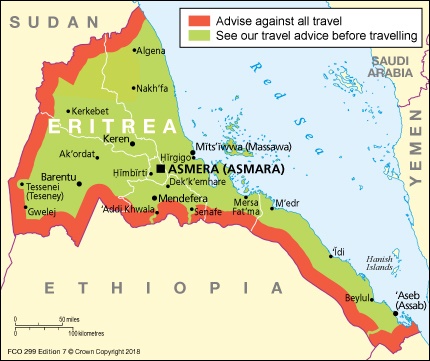Foreign travel advice
Eritrea
Summary

The FCO advise against all travel within 25km of Eritrea’s land borders, with the exceptions of: the towns of Senafe and Tessenei; the border crossings at Debay Sima – Burre, Serha – Zalambessa and Kesadika (Adi Kuala) – Rama, plus the main paved roads leading to those crossings (as displayed on the map). All border crossings between Ethiopia and Eritrea are currently closed. See Local travel
There is an ongoing outbreak of coronavirus (COVID-19) in China, some other countries in the region and elsewhere. The Government of the State of Eritrea has introduced new measures at Asmara International Airport to monitor coronavirus. See Health
All foreign nationals, including diplomats, must apply in advance for a travel permit to leave the Asmara region. See Travel permits and Consular assistance
The Eritrean authorities consider all British nationals holding either Eritrean or PFDJ identity documents (including out of date documents) as Eritrean nationals.
Consular support is severely limited in parts of Eritrea. Constraints on travel within Eritrea means the British Embassy in Asmara is unable to offer consular assistance to British nationals outside the greater Asmara area. The British Embassy is unable to offer consular assistance to dual nationals in Eritrea. See Dual nationals.
Although there’s no recent history of terrorism in Eritrea, attacks can’t be ruled out. See Terrorism
There may be some shortages of drinking in more remote areas of Eritrea due to the closure by the Eritrean Government of many of the water purification and bottling plants, but imported water from Ethiopia and Sudan is available.
If you’re abroad and you need emergency help from the UK government, contact the nearest British embassy, consulate or high commission.
Take out comprehensive travel and medical insurance before you travel.